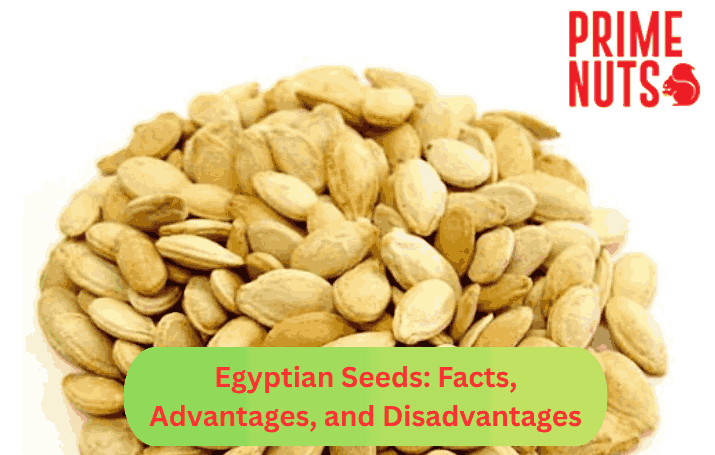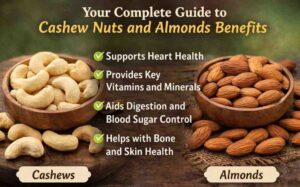
Egyptian Seeds: Facts, Advantages, and Disadvantages

Introduction
More and more health-conscious people and nutrition professionals are paying attention to Egyptian Seeds in recent years. These small, strong seeds have been a part of Egyptian food and medicine for hundreds of years. They have a lot of health and nutritional benefits. But just like any other natural food, they have their good and bad points.
So, what are Egyptian Seeds? Should you eat them every day? Let’s look at the facts more closely, as well as the pros and cons you should be aware of.
What Are Egyptian Seeds?
Egyptian seeds typically refer to a group of nutrient-rich seeds commonly grown or used in Egypt. These include:
- Black seeds (Nigella sativa)
- Fenugreek seeds
- Sesame seeds
- Watermelon seeds
- Pumpkin seeds
- Coriander seeds
- Cumin seeds
- Caraway seeds
These seeds are often used whole or ground in Egyptian food, herbal teas, or pressed into oils. They are rich in essential fatty acids, antioxidants, plant-based proteins, and minerals that support a variety of health benefits.
Advantages of Egyptian Seeds
1. Nutrient-Dense and Rich in Antioxidants
Egyptian seeds are known for their impressive nutritional profile. For example:
- Black seeds contain thymoquinone, a powerful antioxidant and anti-inflammatory compound.
- Sesame seeds are loaded with calcium, magnesium, and zinc—key minerals for bone health.
- Pumpkin seeds offer protein, healthy fats, and a notable amount of magnesium and iron.
These antioxidants help combat oxidative stress in the body, which is a major factor in aging and chronic diseases.
2. Promote Heart Health
Many Egyptian seeds are naturally rich in unsaturated fats, including omega-3 and omega-6 fatty acids. These help in:
- Lowering LDL (bad cholesterol)
- Increasing HDL (good cholesterol)
- Reducing blood pressure
For instance, black seed oil has been studied for its potential to lower cholesterol levels and improve blood circulation, supporting cardiovascular health.
3. Aid in Digestion and Gut Health
Several seeds like cumin, caraway, and coriander have carminative properties. This means they help in reducing bloating, gas, and indigestion. These seeds are often used in Egyptian and Middle Eastern cuisine not only for flavour but also to aid post-meal digestion.
Fenugreek seeds, in particular, are high in soluble fibre, which adds bulk to stool and supports a healthy gut microbiome.
4. Natural Immunity Boosters
Egyptian seeds like black seeds (Nigella sativa) are often referred to as “the seed that cures everything but death,” based on ancient Arabic and Islamic medicine. These seeds have antibacterial, antiviral, and antifungal properties. Regular consumption may:
- Strengthen the immune system.
- Help the body fight infections.
- Improve response to seasonal allergies.
5. Hormonal Balance and Women’s Health
Fenugreek and sesame seeds are known to support hormonal health in women. These seeds may help in:
- Reducing menstrual cramps
- Supporting lactation in breastfeeding mothers
- Easing symptoms of menopause
Black seeds are also said to promote reproductive health in both men and women, especially when consumed in oil form.
6. Blood Sugar Control
Some Egyptian seeds can help regulate blood sugar levels. Fenugreek, in particular, contains compounds that improve insulin sensitivity. It is often used by people managing type 2 diabetes to prevent sugar spikes.
Studies have shown that adding fenugreek seeds to meals may slow carbohydrate absorption and reduce post-meal blood sugar levels.
7. Affordable and Easy to Store
Unlike exotic superfoods, Egyptian seeds are relatively inexpensive, widely available in spice shops and online, and have a long shelf life when stored properly. This makes them an accessible superfood for many households.
Disadvantages of Egyptian Seeds
Despite their numerous benefits, Egyptian seeds must be consumed with care. Here are a few important cautions:
1. Possible Allergic Reactions
Some seeds, especially sesame and pumpkin seeds, are known allergens. Individuals with seed allergies may experience:
- Rashes
- Digestive discomfort
- In rare cases, anaphylaxis
Always introduce seeds gradually into your diet and consult a doctor if you’re allergic or unsure.
2. Overconsumption Risks
Though healthy, eating large quantities of these seeds can lead to adverse effects. For example:
- Excessive fenugreek may cause digestive upset and a maple syrup-like body Odor.
- Too much black seed oil may cause liver toxicity or interfere with medications.
- Sesame seeds are high in calories and fats—overconsumption can lead to weight gain.
Stick to moderate daily servings—typically one to two teaspoons of whole seeds or oils.
3. Medication Interactions
Certain seeds can interact with medications. For example:
- Black seed oil may affect blood-thinning medications.
- Fenugreek can interfere with diabetes or thyroid drugs.
If you’re on any long-term medication, consult a physician before adding these seeds to your routine.
4. Quality and Purity Issues
Not all seeds available in the market are of the same quality. Some may be:
- Chemically treated
- Mold-contaminated
- Processed with additives or preservatives
It’s important to buy seeds from trusted sources, preferably organic or cold-pressed varieties for oils.
FAQs About Egyptian Seeds
Q1. How can I consume Egyptian seeds daily?
You can sprinkle them on salads, mix them into smoothies, add them to bread or porridge, or brew them into herbal teas. Oils can be used in cooking or taken as a supplement.
Q2. Are these seeds safe for children?
Yes, in small amounts. However, always consult a paediatrician before introducing seeds to a child’s diet, especially if there’s a family history of food allergies.
Q3. Can pregnant women consume Egyptian seeds?
Most seeds are safe in moderation, but pregnant women should avoid high doses of fenugreek and black seed oil unless advised by a doctor.
Q4. How should I store Egyptian seeds?
Keep them in an airtight container, away from sunlight and heat. Oils should be stored in a cool, dark place to maintain their potency.
Final Thoughts: A Treasure Trove of Nutrition-With Balance
Egyptian seeds are ancient superfoods that have stood the test of time. They are rich in nutrients, support multiple body systems, and offer a flavourful, natural way to boost your health. However, like any powerful natural ingredient, they should be used with awareness and moderation.
When sourced properly and consumed wisely, these seeds can be a delightful, beneficial addition to your daily diet—just as they have been in Egyptian households for centuries.



